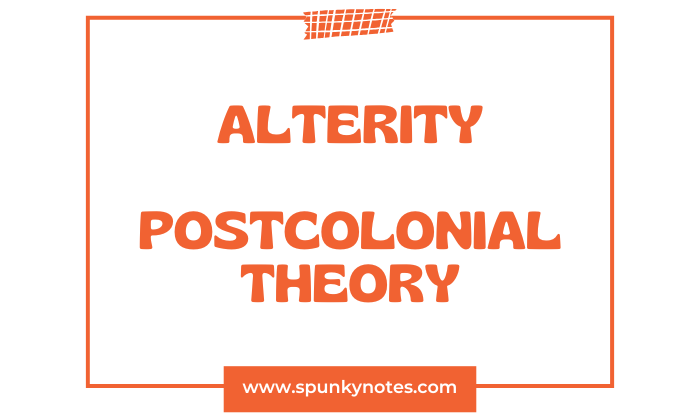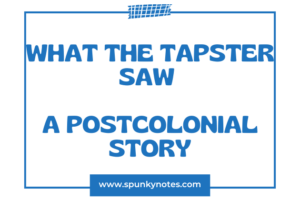
Estimated Reading Time: 4 min

Q. Write a note on alterity in Postcolonial theory.
Alterity
Alterity is commonly associated with the concept of “Otherness.” In simple terms, it means recognizing someone who is not like you.
This can be based on culture, race, religion, or even personal experiences. In philosophy, the idea of alterity focuses on the relationship between the “Self” (one’s identity) and the “Other” (those different from oneself).
This relationship can shape how societies treat each other, sometimes leading to exclusion or discrimination.
The Oxford English Dictionary defines alterity as;
State of being other or different.
In practice, alterity involves a sense of separation between the Self and the Other. It is often seen in interactions between different social, cultural, or racial groups.
Historical Development
The idea of alterity has existed for a long time in philosophy. Philosophers such as René Descartes and Immanuel Kant wrote about the Self and the Other in ways that emphasized reason and understanding.
However, in earlier traditions, the Self was seen as more important, while the Other was often viewed as a problem to be understood or solved.
Western philosophy often emphasized the importance of knowing and controlling the Other. For example, explorers and scientists viewed the people they encountered as subjects for study rather than as equals. This attitude contributed to the development of colonialism and racism.
In the 20th century, philosophers like Emmanuel Levinas challenged these ideas. Levinas argued that the Other should not be seen as an object for the Self to understand or control.
Instead, the Self has an ethical responsibility to respect the Other and allow them to exist in their own uniqueness.
Alterity in Postcolonial Perspective
Alterity, or the construction of the “Other,” plays a critical role in postcolonial discussions. It highlights the processes through which colonial powers defined themselves in opposition to colonized peoples, creating hierarchical relationships based on race, culture, and religion.
In postcolonial theory, alterity relates to justifying colonial rule. Colonizers see themselves as rational and superior, while they depict the colonized as irrational and inferior.
This division into Self and Other justifies the exploitation of colonized areas and people. Edward Said’s concept of Orientalism shows how Western powers described the East as éxotic and dangerous to support their dominance.
During colonization, Europeans often labelled Indigenous people or colonized populations as “savages” or “subhumans.” This way of thinking positioned these people as “the Other.”
By treating these groups as “the Other,” colonial powers justified excluding them from positions of authority or influence. The so-called “Others” were often stereotyped as morally or culturally “evil” or “backward.”
Main Points About Alterity
The Construction of “The Other”
Colonizers create an image of colonized people as fundamentally different from themselves. This perception is often based on race, culture, or a perceived level of civilization. They see colonized people as inferior or primitivè.
Colonizers use these differences to reinforce their power. They claim that the “Other” is somehow lesser or needs guidance.
Identity and Difference
Alterity highlights how colonizers place colonized people into a position of enforced difference. Colonizers label them “different” or “uncivilized” to justify control. This label reinforces the colonizers’ own sense of superiority.
The imposed difference motivated colonizers to control or alter the lives of those they dominate. They viewed themselves as more advanced or knowledgeable.
Cultural Impact
Alterity can deeply impact how colonized people view themselves. Over time, they may begin to internalize the negative image created for them. They start to see themselves through the lens of “the Other.”
This can lead to feelings of inferiority or a loss of connection to their own cultural identity. The colonized may feel distanced from their roots.
Resistance
In postcolonial thought, alterity also becomes a basis for resistance. Recognizing and reclaiming their identity and culture, colonized people can challenge the idea of “the Other.”
This allows them to affirm their value and identity. Resistance gives them the power to redefine themselves. They can move away from the labels imposed by colonizers and assert their worth on their own terms.
Colonial Language and Discourse
Language plays a significant role in creating alterity. Colonizers use language to describe and define the colonized as “the Other.” This often happens in ways that dehumanize or marginalize the colonized.
Postcolonial writers sometimes reshape this same language. They use it to express their own voices and identities. By doing so, they challenge the definitions imposed by colonizers and reclaim language as a tool for self-expression and empowerment.


Thank you for your efforts in sharing knowledge. Your explanations is easy to understand.